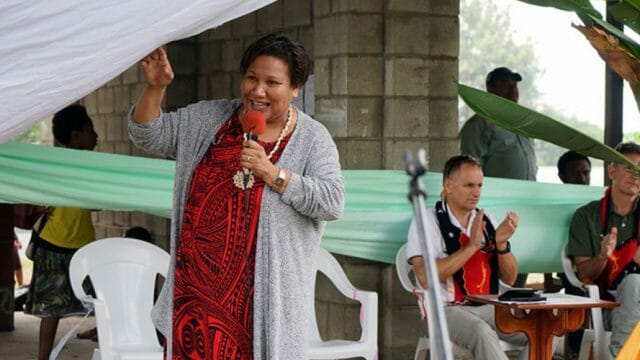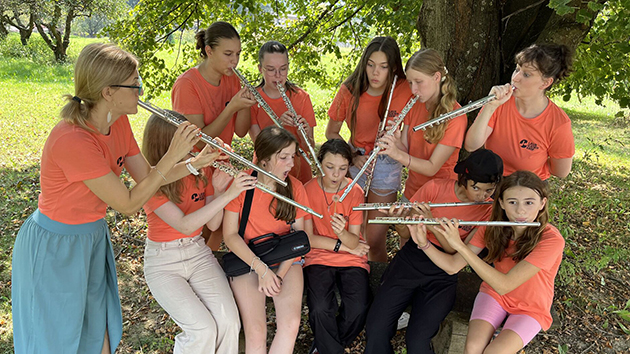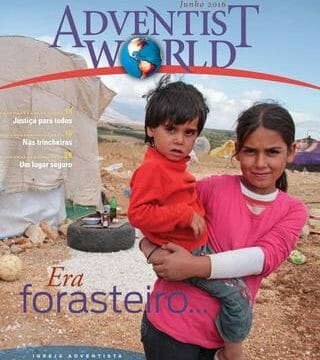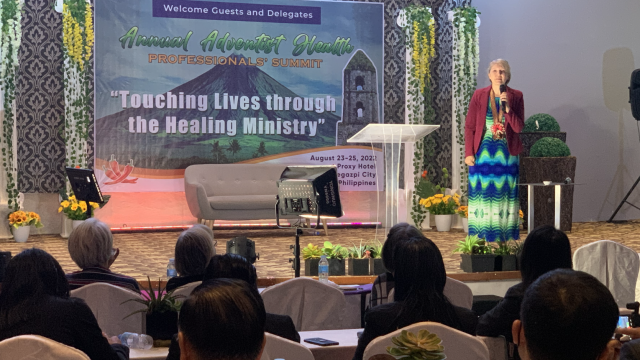What would Jesus say to that?

Associate editor Lael Caesar talked with Noah Washington, associate pastor of the Emmanuel-Brinklow Seventh-day Adventist Church in Ashton, Maryland, United States, about stories and preaching. —Editors.
How did you come to gospel ministry?
I was 7 or 8 years old. Elder C.D. Brooks was preaching, “Stay With the Ship.” And I heard a voice saying, “Do that.” I started looking around to see who might be telling me that. Everyone was engaged in the sermon, crying, receiving the sermon. And it was at that moment, at that age, that I felt God was calling me to ministry.
At Pine Forge Academy God dealt with me and honed some skills. I was fifty-fifty; some of it was just a novelty. By the time I got to Oakwood, I just settled into it.
You’ve had some physical struggles.
Yes. The summer of 2009 I caught Lyme disease. It has been a difficult journey. But one day while I was crying alone—I didn’t want my family to see me—I turned on the TV and heard Wayman Tisdale¹ say, “I’m here to tell you, with the help of God you can get through whatever you want to in life.”
That spoke to me. And so I just decided that though I have very dark days and difficult patches, I’m going to try to keep standing and keep pressing through.
Let’s talk about your preaching. How do you prepare a sermon?
I actually don’t think I can preach well. I just have this philosophy that if it doesn’t make sense to me, it won’t make sense to anybody else. So while I’m working on it, God is dealing with me. And as most humans, I don’t like to be dealt with. But the Spirit of God said, “You got to preach the whole gospel. You have to preach stuff that is still being worked out in your own life.”
I was sent to you when I asked for someone who does great narrative preaching. What do stories have to do with preaching? And what do stories do to your preaching?
As I think, stories have everything to do with preaching. For two reasons. First, it was Christ’s method of teaching. He used things that were common to the people of the day, the lilies of the fields, etc., things that people were extremely familiar with on a regular day-to-day basis. And He used those things to communicate the truth of the gospel. Right? So, first, stories are important because it was the Lord’s method to use stories: one man had two sons; there were 10 virgins, five wise and five foolish.
And second, there isn’t a person alive—and if they are alive, I will check their pulse—there is not a person alive who doesn’t enjoy a good story.
That’s it?
People are made millionaires because they act in a story; or because they write a story—box office [success]! People have been watching even more films now during this pandemic. My wife has taken some time off from work. So two days ago we sat down for a while and watched a good movie on television; and the story line had me captivated from the very beginning. I’m the type of guy that if you tell me, “Hey, Noah, you need to go watch this,” my senses are heightened, because what you’re telling me is the story line is good. So when I go to watch, my senses are heightened. If what I see doesn’t match how you shared it, then don’t tell me to go watch another movie. Because you’ve disappointed me, right?
Every week when the man or woman of God stands up to preach the Word, there is an expectation. There should be an expectation there, heightened because someone has said that the story of Jesus is a good story. So I think stories are important because it was part of Christ’s method, but also everyone loves a good story. Every age, every ethnicity, every culture, they love to hear a good story. And so I think stories are a great way to communicate the gospel.
Who were your heroes when you were seeking to define yourself? And are there places you want to send the people who read this interview—books, or other such sources?
When I was growing up, I just knew that C. D. Brooks was God’s greatest gift to earth. And it was a thrill of mine to have a relationship with him, to pick his brain. And then, I don’t know if there was anyone who was a better narrative preacher, a better story preacher, than Walter Pearson, Jr. He could make a simple story be ready to go to the blockbuster screen. Just the way he told stories! I would sit in awe, watching Breath of Life.²
E. E. Cleveland [was] a great spiritual man. Later, Dr. John Trustee; his preaching really spoke to me. And a final name: Growing up, I guess it was the pastoral culture that the pastor preacher was here, and the people were there. And for me, the first pastor I knew that just allowed me to come into his life, his circle, was Pastor Ronald Edmonds. When he preached, I said, Wow, this guy believes what he’s preaching. So I think from Uncle Ron, as I call Pastor Edmonds, I learned power and control and conviction and passion.
And sources?
Certain Sound of a Trumpet, by Samuel Proctor. The Witness of Preaching, by Thomas Long. The Witness of Preaching talks about different ways you can go about crafting a sermon to reach more listeners. Excellent resource.
Wrap it up for us, Elder.
When you stand before the people, God is literally using you to communicate His will. God uses preaching. And it’s arguably one of the most humbling things a human could ever do. The sermon should be the continuation of what God has been speaking into your life already.
¹ Former professional basketball player who had his leg amputated because of bone cancer.
² Breath of Life is a television ministry in North America: C. D. Brooks was its first speaker, followed by Walter Pearson, Jr., and now Carlton Byrd.








